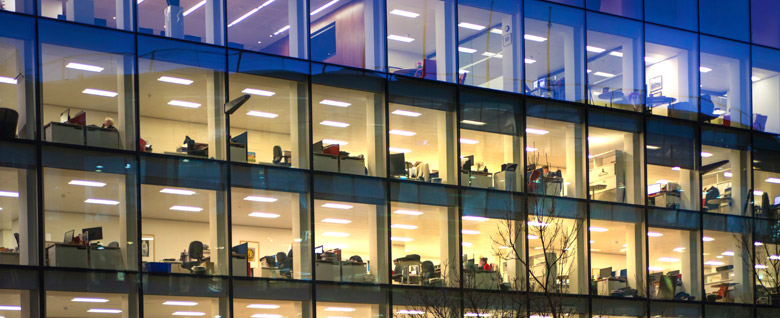Being a commercial landlord can be highly rewarding but it also entails a number of legal responsibilities. Make sure you don’t fall foul of the law with our simple guide.
What fire regulations do I need to comply with?
The Regulatory Reform (Fire Safety) Order 2005 imposes various duties on the ‘responsible person’ with regards to fire safety in commercial properties.
The ‘responsible person’ is defined as
- an employer
- the owner
- the landlord
- an occupier
- anyone else with control of the premises, for example a facilities manager, building manager, managing agent or risk assessor
If there’s more than one responsible person, you have to work together to meet your responsibilities. Therefore in shared premises it’s likely there’ll be more than one responsible person. You’ll need to co-ordinate your fire safety plans to make sure people on or around the premises are safe.
So, in the circumstances where the whole of the building is let to one occupier the obligation to carry out a fire risk assessment is the responsibility of your tenant.
But you should always include fire safety in any risk assessment and you might also have to supply fire safety equipment, though that should be detailed in the lease.
Further, when building new premises or doing building work on existing premises, you must comply with building regulations. This includes designing fire safety into the proposed building or extension.
It is worth noting that if the premises you let out are being used as something other than a workplace, such as an unmanned storage warehouse for example, you are the responsible person under fire safety regulations.
What are my legal responsibilities with regards to gas and electricity safety?
This area is your responsibility as the landlord.
The Gas Safety (Installation and Use) Regulations 1998 say you have to maintain all gas installations and appliances, organise an annual inspection by an official gas safe registered engineer and keep records for a minimum of two years.
If you fail to do this, you could face a large fine and/or imprisonment.
With regards to electricity safety whilst there is no “legal” requirement to provide a certificate to the tenant, but the Electrical Safety Council has made recommendations as to how testing should be carried out and how often. You must however ensure that electrical safety is maintained and ensure that all reasonable steps and precautions are taken to keep your tenant safe.
As such, you are recommended to carry out safety testing every five years or on a change of tenancy.
If you don’t meet these requirements, you could end up facing a substantial claim for compensation.
Do I have any other health and safety responsibilities?
Your other primary responsibility as a landlord in terms of health and safety is for the communal areas as defined in the lease.
What do I need to be aware of in relation to fixtures and fittings?
Fixtures and fittings in your property must be safe to use.
Your tenant will normally be responsible for maintaining any fixtures and fittings they installed themselves. It is best to specify who is responsible for what in the lease.
What are my responsibilities for maintenance and repair at my property?
If you have a number of occupiers in one building then it would be normal for you to be responsible for maintaining the building at your cost but you would then seek to recover that cost by way of a service charge from your tenant. It is therefore important that the lease is drafted in such a way that you are able to recover your expenditure.
While in occupation, your tenant may ask if they can do work to the property. Again the lease should govern what the tenant can and cannot do and what consent they have to obtain from you to carry out the works. Generally if this happens, you should make sure they provide detailed plans before you give permission.
It is essential that your lease clearly sets out all the differing responsibilities of yourself and your tenant are set out in the lease regarding repair, maintenance and works.
What regulations relating to asbestos do I need to be aware of?
Under the Control of Asbestos Regulations 2012, a ‘dutyholder’ has a responsibility to manage any asbestos. The “dutyholder” is the owner of the non-domestic premises or the person or organisation that has clear responsibility for the maintenance or repair of non-domestic premises. In practise, it is nearly always the tenant’s responsibility as it is unlikely the landlord would agree to managing asbestos when they are not in occupation or control of the premises.
While this will normally end up as the tenant’s responsibility, it is essential that you include asbestos when making a risk assessment.
Penalties for failing to observe the law include a fine of up to £20,000 and a two-year prison sentence.
What is the Code for Leasing Business Premises in England and Wales 2007?
The code is a clear, concise and authoritative account of the responsibilities of commercial landlords and tenants. It has been endorsed by a number of industry bodies.
While you are not legally obliged to follow the code, it is worth at least being aware of it.
The code covers:
- lease negotiations
- rent deposits and guarantees
- length of term, break clauses and renewal rights
- rent review
- assignment and subletting
- service charges
- repairs
- alterations and changes of use
- insurance
- and ongoing management
You can read the full code here
Please note that The Royal Institute of Chartered Surveyors (RICS) have published a consultation on a professional statement “Code for leasing business premises” with a view to incorporate a new ‘Proposed Code’ to replace the 2007 Lease Code.




Comments